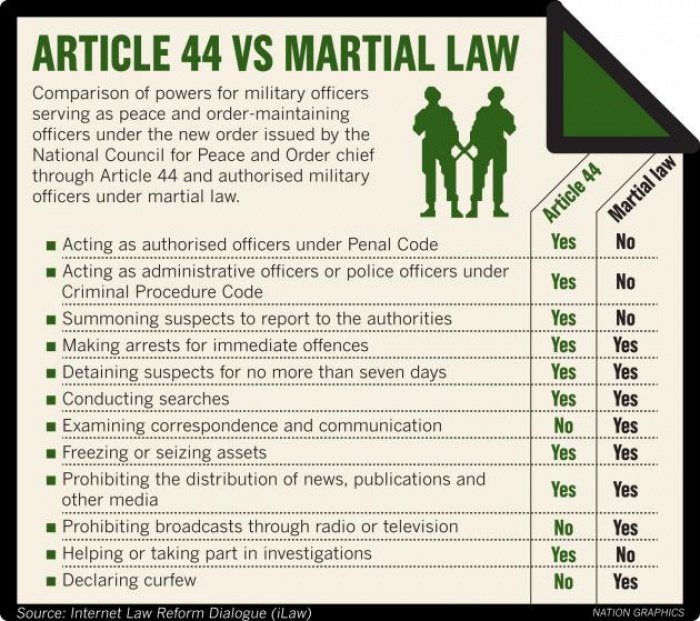US, UN envoys voice worrying concerns over Article 44

– Thailand news selected by Gazette editors for Phuket’s international community
PHUKET: The government may have received some plaudits for lifting martial law from the local business community, notably the tourism sector, but the international community, especially the United States and the United Nations, besides rights groups have lashed out at the government for invoking Article 44 of the interim charter.
The National Council for Peace and Order (NCPO) replaced martial law with a 14-point order under Article 44, authorizing Prime Minister Gen Prayut Chan-o-cha, as the junta chief, to have unlimited power to handle security and political matters.
The UN High Commissioner for Human Rights, Zeid Ra’ad al-Hussein, yesterday expressed “alarm” at the decision to invoke Article 44, saying it bestowed unfettered authority on the head of the military government.
“Normally I would warmly welcome the lifting of martial law – and indeed strongly advocated for it to be lifted in Thailand,” Hussein said. “But I am alarmed at the decision to replace martial law with something even more draconian, which bestows unlimited powers on the current prime minister without any judicial oversight at all.
“This clearly leaves the door wide open to serious violations of fundamental human rights. I appeal to the government to ensure that these extraordinary powers, even if provided for by the interim constitution, will nevertheless not be exercised imprudently.”
A US State Department official said Washington expected the Thai military to end trials of civilians in military courts and detention without charge and to allow people to express their opinions freely.
“We are concerned that moving to a security order under Article 44 will not accomplish any of these objectives,” the official was quoted as saying by Agence France-Presse.
The business sector, however, was optimistic about the positives from the ending of martial law. The tourism sector believes it would allow people to get travel insurance. Unlike martial law, Article 44 will have no impact on foreign tourists or general people, said Anon Vangvasu, president of the Thai General Insurance Association. Up to now, foreign insurance companies have been unable to offer travel protection to their customers, he said.
Thanavath Phonvichai, adviser to the Thai Chamber of Commerce and director of the Economic and Business Forecasting Center, said Article 44 should be judged by how the powers are used and whether it improves efficiency and create peace for the long term.
But Saman Zia-Zarifi, International Commission of Jurists regional director for Asia and the Pacific, said Article 44 did not address significant concerns about the human-rights situation in Thailand and was in fact even more worrying than martial law.
“In some ways it increases concerns because the new orders are essentially arbitrary, since [orders] are issued under Article 44 instead of existing frameworks like through martial law, the Internal Security Act and the emergency decree, where there are precedents,” he said.
Zia-Zarifi cited a number of problematic details of the new junta order, which includes designating officers to maintain peace and order. These are military personnel assuming the role of police investigators. It also allows searches without a warrant, seven-day detentions without charge at an informal facility, restrictions on freedom of expression, and restrictions on the political assembly of more than four persons.
The security officers enjoyed impunity under orders 13 and 14 of Article 44, he said, and warned that this boded ill and heightened the risk of forced disappearance and torture.
Matthew Wheeler, Bangkok-based Southeast Asia analyst at the International Crisis Group, said that if the replacement of martial law with Article 44 was designed to reassure the international community, and that the NCPO’s exercise of power was benign, it might be a forlorn measure.
“The government retains the relevant powers it had under martial law. Article 44 is even broader in scope than Article 17 of the 1959 Constitution [exercised by Field Marshal Sarit Thanarat], because it allows the head of the NCPO to take actions in the interest of not only national security but also ‘reform’ and ‘national unity’,” he said.
Shawn Crispin, senior Southeast Asia representative for the New York-based Committee to Protect Journalists, said Article 44 posed a “clear and present danger to journalists”. He said that if the government were serious, it should not pass laws that suppressed or censored the press.
— Phuket Gazette Editors
Latest Thailand News
Follow The Thaiger on Google News:


























